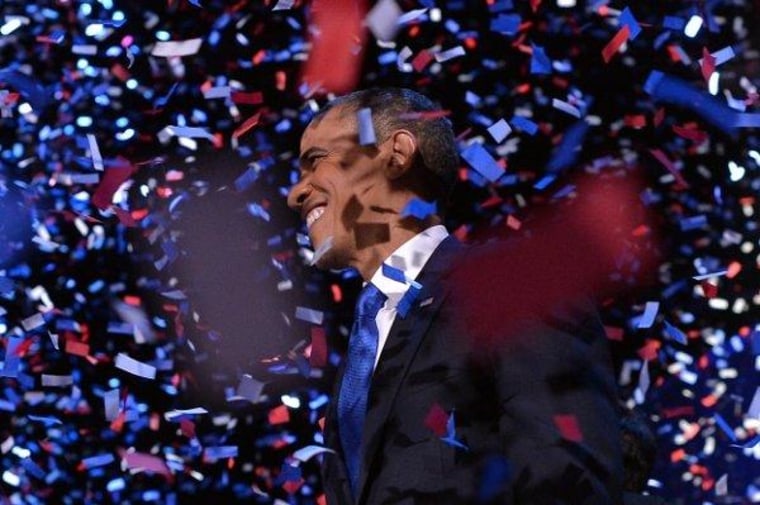As impressive as President Obama's re-election victory is, it's worth pausing to appreciate the larger context, because it wasn't just his presidency on the line.
Had Obama come up short, the immediate threats to key public policies would have been significant, but the more sweeping consequence would have been the lasting damage to a progressive vision of governance.
It's easy to imagine the recriminations this morning had the election gone the other way. The president's 2008 victory would come to be seen as a faddish fluke, but more importantly, everything Obama fought for in his first term would be evidence of failure. For the foreseeable future, presidents would be told not to be ambitious, not to use government as a tool to make a material difference in the lives of working families, and not to rely on Keynesian economics to grow the economy through investments ... or they too will end up as a one-term disappointment.
The 2012 election, then, can be seen as a referendum on Obama's presidency -- a test he passed yesterday in impressive fashion -- and a referendum on the liberal experiment.
It's what makes the president's electoral success, not just significant in the short term, but important in the long term. Obama's agenda has a new opportunity to make a meaningful, positive difference in the lives of America's middle class, but it also establishes a precedent for history -- presidents can pursue big, bold, consequential priorities, and be rewarded for it.
As for whether or not the president has earned a "mandate," early indications suggest the media establishment has already made up its mind. It was 11:12 p.m. last night when Ohio went to Obama, assuring his second term, and it was 11:41 p.m. -- just 29 minutes later -- when National Journal published an item insisting that Obama's victory "comes with no mandate."
Let's consider exactly what this means -- and why the question itself is rather dubious.
The amorphous idea of a "mandate" is based on the notion that a candidate runs on an agenda, gets elected, and earns the right to expect that his or her agenda will be given a shot. Those arguing that Obama lacks a mandate apparently believe the president wasn't pushing a specific enough vision during the campaign, and should therefore adjust his expectations downwards.
I understand the point, but I'm not sure it matters. For one thing, Obama really did present a relatively detailed agenda, which includes measures that are quite popular with the American mainstream. For another -- and this is important -- Obama won big. Once Florida is called, the president will end 2012 with 332 electoral votes and a majority of the popular vote.
To put that in context, Obama easily surpassed George W. Bush's two victories -- and Republicans had no problem saying he had a mandate -- and is now the most successful Democratic presidential candidate since FDR (Clinton won twice, but came up short of popular-vote majorities both times).
I don't imagine congressional Republicans would care if the president had won 538 electoral votes -- which makes the debate over mandates itself something of a moot point -- but if anyone has earned the right to a fair hearing of his policy priorities, it's Barack Obama.
But even putting that debate aside, as the dust settles on a long, difficult election cycle, the fact remains that Republicans saw an opportunity to win, and threw everything they had at President Obama. This morning, he's still standing.
So, too, is progressive governance.
